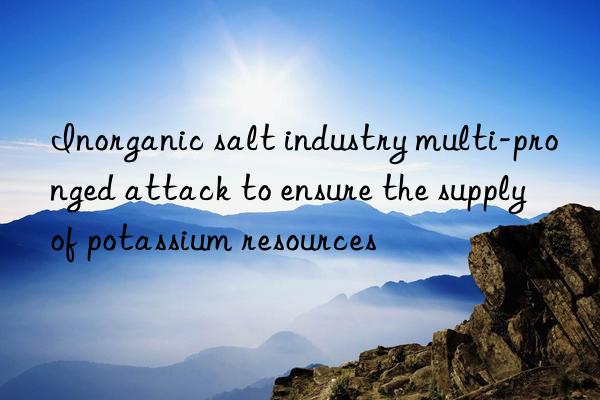
my country's potassium resources only account for 2% of the world's reserves, but its consumption exceeds 20% of the world's total consumption
Facing the problems of lack of potassium resources, high dependence on imports, and inability to guarantee supply chain security, my country's inorganic salt industry has taken active actions in recent years in mineral exploration, overseas development, technology upgrading, and efficient utilization to ensure the supply of potassium resources. This is the message from the 2023 World Potash Conference and Golmud Salt Lake Forum - Potash Summit Forum held in Golmud, Qinghai Province on June 8.
Zhang Yongsheng, a researcher at the Chinese Academy of Geological Sciences, said that in the new round of prospecting breakthrough strategic actions, a total of 7 potassium salt prospecting areas were deployed across the country. According to the current exploration progress forecast, the cumulative new potash resources will reach 700 million tons in 2035, which can effectively guarantee the future potash fertilizer supply in my country. Zhang Jinming, a senior engineer at the Qinghai Provincial Geological and Mineral Exploration and Development Bureau, made a metallogenic prediction based on ore-forming units and metallogenic characteristics, and preliminarily predicted that the potash prospecting potential of the Qaidam Basin is 1.2 billion tons.
Breakthroughs have been made in the development of overseas potassium resources in my country in recent years. "Currently, Chinese enterprises' overseas 'potassium search' projects involve 10 countries and regions including Laos, Thailand, Congo (Brazzaville), and Eritrea, and the number of statistical projects is 24." Chen Guofu, honorary president of China Inorganic Salt Industry Association, said that according to the current situation According to planning and design, by 2030, the annual production capacity of my country's overseas potash development projects is expected to reach 7 million to 10 million tons.
Liu Bingyan, director, secretary of the board of directors and deputy general manager of Potassium International Investment (Guangzhou) Co., Ltd., said that in the "Belt and Road" initiative and the "three-three-three" system (domestic, imported, and overseas bases each account for 1/3 ) under the guidance of Potassium International, as the first batch of Chinese companies to "go global" to implement overseas potash development, successfully created an overseas potash development model. In March 2023, the "1 million tons/year potassium fertilizer reconstruction and expansion project in Laos" invested and constructed by the company successfully reached production capacity, becoming the first million-ton potash fertilizer project outside my country.
The announcement recently released by Salt Lake also shows that in 2023, the company will actively promote the strategy of "going out of potassium" and promote the grafting of superior resources, capital, technology, and markets; development and status of potash production.
In addition, my country has also made a series of breakthroughs in the efficient utilization of potassium resources. Zhang Ye, a professor at East China University of Science and Technology, introduced the heat and mass recovery technology and equipment for potassium chloride drying tail gas developed by his project team. Through the design optimization of low-resistance and high-efficiency dust collectors, the project realized the recovery and utilization of potassium chloride and waste heat in the high-temperature tail gas of potassium chloride.
Zhang Ye said that potassium resources are the ballast stone to ensure national agriculture and food security. However, my country's potassium resources are scarce, accounting for only 2% of the world's reserves, but my country's potassium resource consumption exceeds 20% of the world's total consumption. "At present, my country's potash salt and potash fertilizer is about 50% externally dependent. Last year, changes in the international situation caused the supply chain to be blocked, and the price of potash fertilizer also rose rapidly." Zhang Yongsheng said that as of 2019, my country's potash salt proven resources are 1.016 billion tons, including 809 million tons in Qaidam Basin, Qinghai. According to the current production scale, the reserves can only maintain production for 20-30 years. (Zhao Ruoyi)



 微信扫一扫打赏
微信扫一扫打赏
